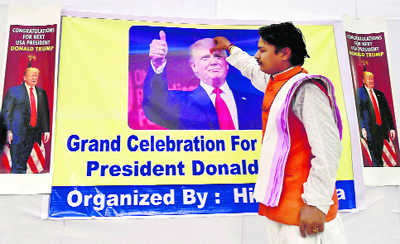DONALD Trump's first speech as US President didn't shed much light on his foreign policy priorities, except for a stray statement that sounded like a shot across the bows of unnamed external enemies. “America will no longer settle for anything less than the best,” he told the outside world. Most of his focus remained on Americans who had handed him an upset victory. The Trump Presidency should theoretically lead to a major reordering of the way the US categorises its friends, enemies and transactional partners. During the election campaign, Donald Trump's perceptions about some of the countries completely upturned the conventionally held wisdom among America's foreign policy practitioners and theorists.
No post-World War American leader (before the War, Russia never figured high in US strategy) had the gumption to formulate views about Russia like Trump. In the eyes of US politicians, diplomats and generals, Russia is the target number one. They have tried every trick in the book, from colour revolutions to positioning missiles on its borders, to keep Russia enchained within its post-1991 borders.
For US diplomats, the arrival of Trump is almost like CPM leader Prakash Karat becoming the Indian Prime Minister. Their twitter accounts and off-the-record conversations indicate the unlearning they will have to undergo such as placing Japan in the all-weather ally bracket and Russia in the to-be-provoked slot.
The US establishment has so far treated India as an unpredictable outsider who must be courteously entertained. India has always hung back because of the American proclivity to impose sanctions on countries not following their protocol for etiquette in global affairs.
India had to face American ire for three years after the nuclear tests in 1998. Indo-US ties frequently encountered such red lines and blind alleys. Technology transfers have been hard to come by and trade talks hardly progress. The Trump Presidency can bring India and the US closer via counter-terrorism. The US establishment has selectively shielded rogues, individuals as well as countries. Indian investigators experienced this first hand when they tried to get at David Headley, involved in the Mumbai 2008 attacks. Indians generally come away with the feeling that the US Administration gives them a less-than-fair hearing on terrorism-related grievances with Pakistan. Trump has been blunt, as he has been on every subject except his tax returns, on stopping immigration from rogue countries that support terrorism. By India's reckoning, Pakistan fits the bill. South Block could make a renewed Indian bid to tar Pakistan, coupled with an offer to shoulder some of America's anti-terrorism burden. This uncomplicated formulation fails to account for the unpleasantness from an eventual tightening of the US visa regime. Stocks of major Indian IT outsourcing giants are already haemorrhaging. New Delhi may feel compelled to lodge pre-emptive protests instead of reacting to a public uproar. Such an approach, however, will appear Luddite. Is it worth getting on Trump's wrong side when artificial intelligence will anyway wipe out most of the existing job opportunities that have employed Indians in IT-enabled services? Especially when there is little likelihood of Trump walking back from a hard line on immigration that captivated his voter base.
For the first time, a US presidency will not view India and Russia as eternal outsiders. There are complications in a simplistic vision such as that. Take Russia first. The US has installed missiles on Russia's borders with Europe. For public consumption, the US says this is a pre-emptive move to counter Iran's ballistic missiles. Trump may be willing to dismantle the missile shield on Russia's borders to set the tone for reducing tensions with Vladimir Putin. Trump has identified Iran as the biggest harbourer of terrorists. He will be hard placed to dismantle the missile system that is ostensibly targeted against the new Administration's first enemy, even if it eases Russia's security-related fears.
India-US ties too will also face similar complexities. Other countries are bound to counter any signs of intimacy between India and the US. China will react to the shake-up in the regional power balance by getting closer to Pakistan and Iran. Russia cannot view Iran through the same lens as the US White House. India too cannot afford to hurt its national interests by turning against Iran, as the White House might expect.
The same complication will be at play in South China Sea. Obama's “Pivot to Asia” will be dead after the US Congress pulls the plug on its economic underpinning, the Trans-Pacific Partnership. New partnerships and antagonisms will emerge as India, Japan, Vietnam and Australia will closely watch for signs of a rethink in the US on the wisdom of battling with China in the Indo-Pacific on behalf of its allies. Intra-nation inter-linkages, historical hostility and self-interest will at some point derail Trump's unsophisticated, one-dimensional foreign policy. Narendra Modi's experience with China and Pakistan is a good example. India should neither feel comforted nor fear Trump's pre-polling soliloquies. The world is too complicated for that.
sandeep4731@gmail.com
Unlock Exclusive Insights with The Tribune Premium
Take your experience further with Premium access.
Thought-provoking Opinions, Expert Analysis, In-depth Insights and other Member Only Benefits
Already a Member? Sign In Now










